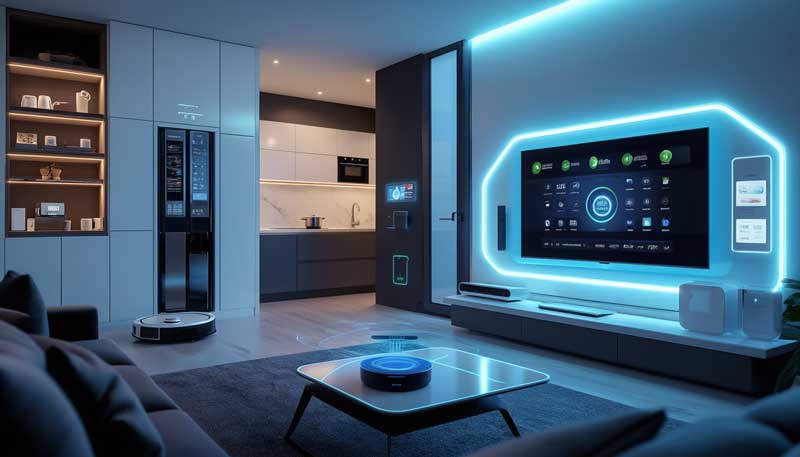Home ➢ Smart Home Trends
5 Smart Home Trends That Will Transform Your Living Space in 2025

The smart home revolution is accelerating in 2025, with new technologies making our living spaces more intelligent, efficient, and responsive to our needs. Unlike the early days of smart homes that required complex setup and technical expertise, today's solutions focus on seamless integration and user-friendly experiences that genuinely improve daily life.
These emerging trends aren't just about adding more gadgets to your home—they're about creating integrated ecosystems that learn your preferences, anticipate your needs, and optimize your living environment automatically. From energy savings to enhanced security, these innovations are transforming houses into truly intelligent homes.
1. AI-Powered Home Automation That Actually Learns
The next generation of smart home systems goes beyond simple scheduling and voice commands. Advanced AI algorithms now learn your daily patterns, seasonal preferences, and even mood indicators to automatically adjust lighting, temperature, and ambiance without any input from you.
These systems understand context—they know the difference between when you're home alone versus entertaining guests, when you're working from home versus relaxing, and when you need energizing light versus calming ambiance. The result is a home environment that feels intuitively responsive to your lifestyle.
2. Integrated Health and Wellness Monitoring
Smart homes are becoming wellness partners, continuously monitoring air quality, humidity, temperature, and even circadian rhythm support through automated lighting adjustments. Advanced systems can detect when someone in the household might be getting sick based on sleep patterns, room usage, and environmental factors.
These health-focused features include automated air purification when outdoor pollution levels rise, humidity control to prevent mold and allergens, and lighting systems that support natural sleep cycles by automatically adjusting color temperature throughout the day.
3. Predictive Maintenance and Energy Optimization
Smart homes now predict problems before they occur. Your HVAC system alerts you to potential issues weeks before breakdown, while smart water sensors detect minor leaks that could become major problems. This predictive approach saves thousands in potential repair costs.
Energy optimization has become incredibly sophisticated, with systems that learn your usage patterns and automatically shift energy consumption to off-peak hours, coordinate with renewable energy sources, and even sell excess solar power back to the grid during optimal times.
4. Enhanced Security Through Behavioral Analysis
Modern smart security goes far beyond cameras and door sensors. AI-powered systems learn the normal patterns of household activity and can distinguish between family members, regular visitors, delivery personnel, and potential intruders based on movement patterns and behavior.
These systems can identify unusual activity—like someone entering a room that's typically empty during certain hours—and respond appropriately, from sending gentle notifications to family members to automatically contacting security services for genuine threats.
5. Seamless Multi-Device Integration and Control
The fragmentation of smart home devices is finally being solved through universal protocols and AI-powered integration hubs. Your smart home system can now coordinate devices from different manufacturers, creating seamless experiences regardless of brand preferences.
Voice control has evolved to understand natural language and context, allowing for complex commands like "prepare the house for movie night" which might dim lights, adjust temperature, close blinds, and activate the entertainment system—all with a single phrase.
Making Smart Home Technology Accessible
Perhaps the most significant trend is the democratization of smart home technology. What once required professional installation and significant investment can now be implemented gradually with plug-and-play devices that learn and adapt to your existing home infrastructure.
Many smart home solutions now offer subscription-free options with local processing, addressing privacy concerns while providing the benefits of intelligent automation. This approach makes smart home technology accessible to renters and homeowners alike.
The Future of Intelligent Living
As these trends continue to evolve throughout 2025, the most successful smart homes will be those that prioritize user experience over feature complexity. The goal isn't to have the most high-tech house on the block, but to create a living environment that genuinely improves your quality of life while reducing energy consumption and maintenance headaches.
The smart homes of 2025 represent a shift from reactive technology to proactive assistance—creating living spaces that truly understand and support the people who inhabit them.
Share this article:
React to this article: